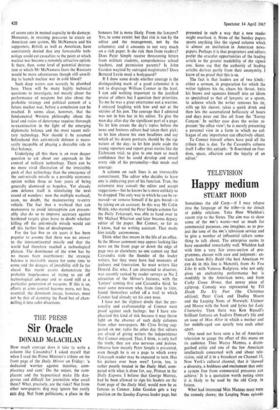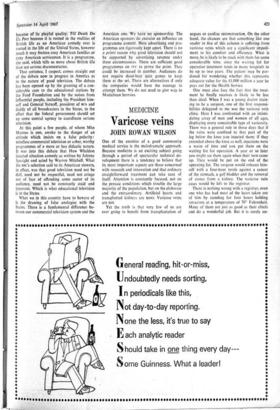Happy medium
TELEVISION STUART HOOD
Sometimes the old Corp.—if I may relapse into the language of the tribe—is no slouch at public relations. Take Huw Wheldon's recent trip to the States. The aim was to show some of the -BBC'S wares—not so much for commercial purposes, one imagines, as to pro- ject the tone of the BBC's television service and to give a number of influential talkers some- thing to talk about. The enterprise seems to have succeeded remarkably well. Wheldon had with him a very fair cross-section of pro- gratrunes, chosen with care and judgment: ex- tracts from Billy Budd (the best American Tv can do in this line is Menotti), from As You Like It with Vanessa Redgrave, who not only gives an enchanting performance but is modishly in the American news, and from Cathy Come Home, that newsy piece of agitprop. Comedy was represented by Till Death Do Us Part (the Christmas edition); Peter Cook and Dudley Moore and the Leaping Nuns of Norwich; Ustinov and Moore with the book and lyrics for Lady Chatterley. Then there was Ken Russell's brilliant fantasia on Isadora Duncan's life and an issue of Man Alive in which a mother and her middle-aged son quietly tore each other apart.
One need not have seen a lot of American television to gauge the effect of this menu on its audience. Thus Marya Mannes, a distin- guished critic and one of the few American intellectuals concerned with and about tele- vision, said of it in a broadcast on Channel 13, New York's cultural channel, that it 'showed a diversity, a boldness and excitement that only a system free from commercial pressures can achieve.' It is a quotation worth noting since it is likely to be used by the old Corp. in
future, •
What had interested Miss Mannes most were the comedy shows; the Leaping Nuns episode because of its playful quality; Till Death Do Us Part because it is rooted in the realities of British life as no American comedy ever is rooted in the life of the United States, however much it may feature cosy American families or zany American servicemen. It is a programme, she said, which tells us more about British life than ten serious documentaries.
That sentence, I suspect, comes straight out of the debate now in progress in America as to the nature of good television. The debate has been opened up by the granting of a con- siderable sum to the educational stations by the Ford Foundation and by the noises from influential people, including the President him- self and General Samoff, president of RCA and daddy of all broadcasters in the States, to the effect that the federal government should set up some central agency to coordinate serious television.
At this point a few people, of whom Miss Mannes is one, awoke to the danger of an attitude which insists on a false polarity: mindless commercial television or sober, worthy programmes of a more or less didactic nature. It was into this debate that Huw Wheldon injected situation comedy as written by Johnny Speaight and acted by Warren Mitchell. What the Bees selection said to its American viewers, in effect, was that good television need not be dull, need not be respectful, need not cringe out of fear of offending some sector of its audience, need not be constantly staid and timorous. Which is what educational television is in the States.
What we in this country have to beware of is the drawing of false analogies with the States. There is a fundamental difference be- tween our commercial television system and the Ameridan one. "We have no sPonsorship. The American sponsors do exercise an influence on programme 'content. Here advertising and pro- grammes are rigorously kept apart. There is no a priori reason why. good television should not be supported by advertising revenue under these circumstances. There are sufficient good programmes on ITV to prove the point. They could be increased in number. Audiences do not require dead-beat 'quiz games to keep them at the set. There are alternatives if only the companies would have the courage to attempt them. We do not need to give wa'y to Manichean heresies.































 Previous page
Previous page